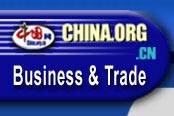Arrangements will be made for foreigners to acquire shares in state-owned enterprises (SOEs) and set up direct investment and equity investment funds in China in the next few years, said Dong Fureng, one of the most prominent economists in China.
Dong once directed the institute of economics at the Chinese Academy of Social Sciences. As early as 1978, he was among the first people to call for reforming SOEs into more efficient enterprise structures.
He is now a key member of the economics committee of the Chinese People's Political Consultative Conference, an advisory body to the Chinese Government, and is a professor at Beijing University.
He gave a series of press interviews and seminar speeches during his recent two-day visit to the SAR. In an address Thursday afternoon, he explained to the audience the specific tasks laid down in the central government's draft of the nation's 10th Five-Year Plan (2001-05).
In the plan, Dong said China will have to facilitate foreign companies' mergers and acquisitions in China and allow them to establish direct investment funds and equity investment funds in the Chinese stock market, with perhaps the only exception of areas which have a significant bearing on national security.
The areas to be opened one after another include the stock exchanges, public infrastructure, commercial banking, insurance, telecommunications, foreign and internal trade and tourism, the economist said.
Present restrictions on foreign ownership will be phased out, with the above exceptions.
This is what China needs to do, not only to achieve better development performances, but also to fulfil its obligation to the WTO.
At the same time, the discrimination against domestic private investors will be dismantled.
And various types of business monopolies, either by region or by industry administrations, will also have to be abandoned as part of the WTO commitment.
The new development plan will lead to a marked decline in state ownership in many industries where it used to be highly concentrated.
Some state-owned banks and insurance companies will be reformed into joint-stock companies, Dong said.
In the development of business laws, China has already revised two. The National People's Congress annual session, scheduled for March, will also revise the nation's law on Chinese-foreign joint-venture enterprises.
Government reform
Furthermore, there will be reforms in the government. The role of the government will be to provide public policies and no longer to interfere with the management of the enterprise.
"This is a great imperative," Dong said. "The government will have to reduce its approval requirements. Unfortunately, even today there are still numerous affairs subject to approval by government agencies which actually can be perfectly run by the market itself and non-government entities."
The decision-making process of the government will have to become transparent once China enters the WTO, he said, and the mechanism of fair competition, now still in its infant stages, will have to grow to maturity.
The nation will also have to build up its defence system against international financial turmoil.
After entering the WTO, Dong said, China will face competition from both the developed and developing world, adding that China cannot compete with foreign countries just by relying on inexpensive labour but must improve its product quality.
In the post-WTO era, he further specified, Chinese agriculture will have a hard time adjusting to the pressure from international competition. The domestic price for Chinese soybeans, he said, is higher than the world market price by more than 80 percent. Agriculture will have to learn to turn out high-quality products by incorporating high technology.
By contrast, in some industries, such as those of textiles and electrical home appliances, Chinese industries will be stronger.
In other industries, such as metallurgical and petrochemical engineering and machine building, China's hope lies in its continuing SOE reform. Then China can compete in low-end and mid-price markets.
The worst threat of competition will be faced by the automobile and pharmaceutical industries, he said, as well as financial, telecommunications and distribution services. In these areas, Dong said, foreign companies' takeovers are hardly avoidable.
(China Daily 12/01/2000)
